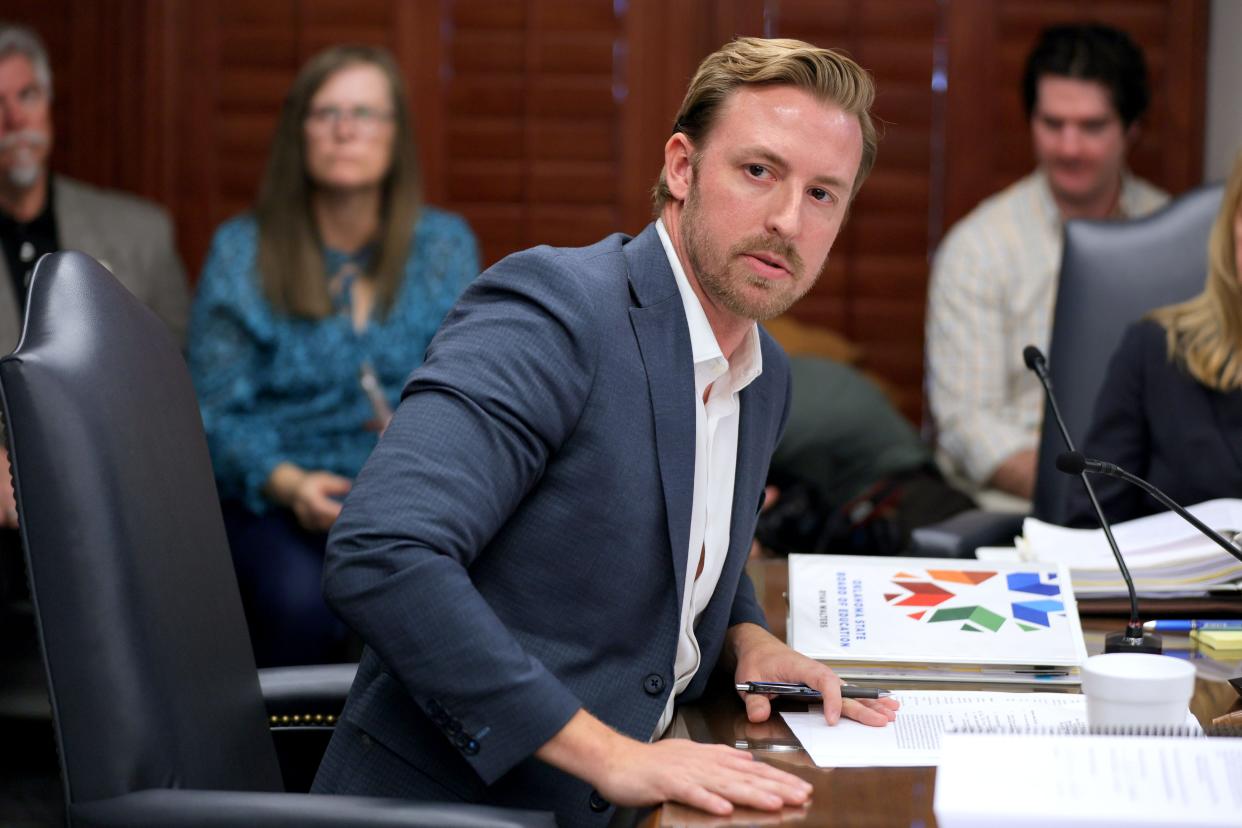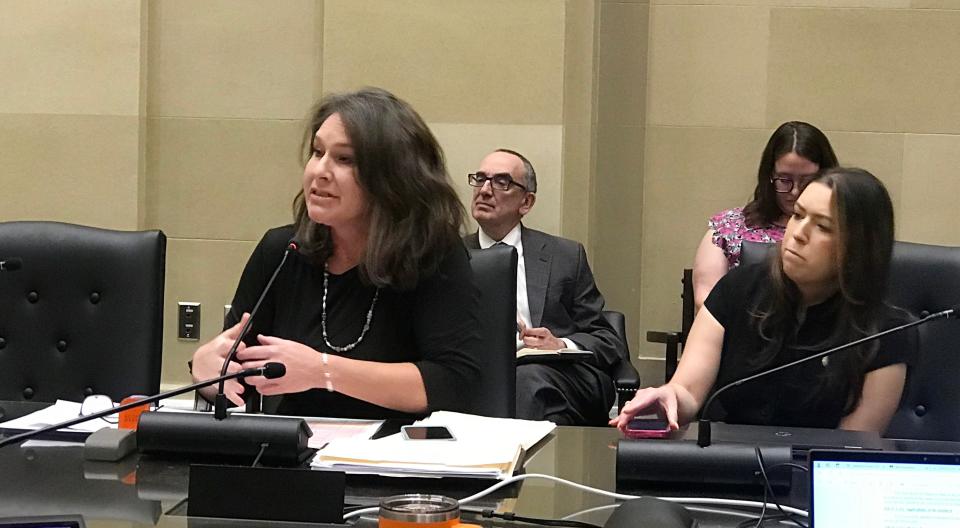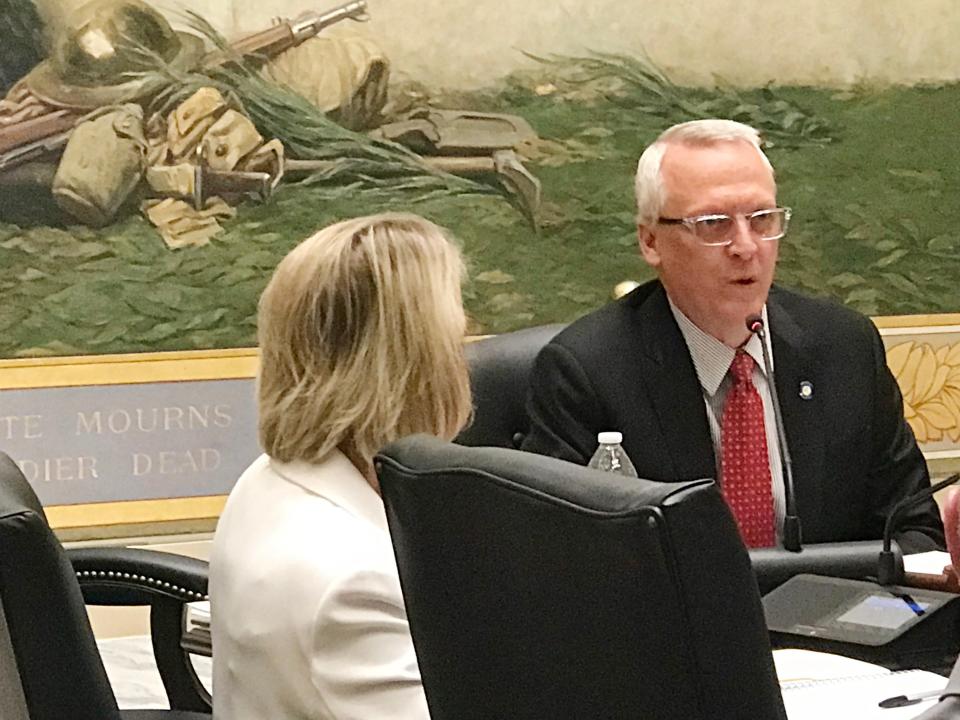Ryan Walters' proposed education rules receive support from GOP lawmakers in a committee

- Oops!Something went wrong.Please try again later.


With one exception, Republicans seemed supportive of proposed new administrative rules from the Oklahoma State Department of Education during a Monday morning meeting of the state House of Representatives’ Administrative Rules Committee.
It was mostly Democrats — as they did six days ago during a meeting of the state Senate Administrative Rules Committee — who questioned the rationale of the proposed rules and the legal authority by which the Oklahoma State Board of Education, led by state schools Superintendent Ryan Walters, developed them. Rep. Melissa Provenzano, D-Tulsa, had the most questions.
The Education Department, which currently has no in-house attorneys on staff, did as it did a week ago at the Senate hearing and sent a lobbyist instead of an outside contracted lawyer to be in the room to answer questions from lawmakers. But unlike the Senate hearing, most of the discussion about the proposed rules was between members, with Rep. Clay Staires, R-Skiatook, and Rep. Collin Duel, R-Guthrie, leading the GOP responses to Provenzano’s assertions that the state Board of Education had overstepped its authority.
“There comes a point where we have to give some discretion to the agency and their rulemaking authority, because it would be pointless for us to list out every single … statute on what the SDE would otherwise regulate,” Duel said. “It would render that agency useless, because we’re having to draft legislation. Then we would have to spend all day, every day, at the Capitol drafting law on behalf of agencies.”
The committee chair, Rep. Gerrid Kendrix, R-Altus, acknowledged the complexity of the administrative rules process.
“I know it’s complicated,” Kendrix said. “I know it’s challenging. It’s often looked at as a curse by those outside of this committee.”
Before proposed agency rules become law, they must be approved by the Legislature — which means committee and floor votes in both the Senate and House of Representatives — and signed by the governor. Kendrix noted that unless the Legislature specifically disapproves of a proposed rule, it’s automatically considered to be approved.
Kendrix said he planned to meet with his Senate counterpart, Sen. Michael Bergstrom, R-Adair, to go over rules that have raised concern.
Aggressive rulemaking by agency has led to lawsuits, political concerns
The state Board of Education’s aggressive rulemaking under Walters since he took office in January 2023 has drawn concern from both sides of the political aisle and at least two lawsuits, one concerning a rule on pronouns and another concerning who has the authority to determine the content of school libraries.
In February, the Board of Education passed a slew of proposed rules regarding school accreditation, prayer in schools, teacher behavior, training of local school board members and diversity, equity and inclusion (DEI) procedures in Oklahoma schools, among other topics. Those rules, and others adopted by the board since the most recent legislative session, are up for review. Democrats claim the rules are null and void because of the way were passed.
With only 90 minutes allotted for the meeting, Provenzano said she had to pick and choose which proposed rules to bring up for discussion. Her general questions on the rules, she said, had to do with whether they were a good idea — regardless of whether the board had the authority to make them.
She specifically questioned rules tying accreditation to academic scores or whether or not a district had a written policy on voluntary prayer, as well as a rule that specifically removed the Oklahoma State School Boards Association, a nonprofit, from a list of automatically approved vendors to provide training for local school board members that is required by law.
Provenzano asked what the OSSBA had done to become excluded and said she hadn’t received “a clear answer for that.”
“What happened to initiate this change? It feels like there needs to be a justifiable reason,” she said, adding that, “The appearance is intentional, if OSSBA has done nothing wrong.”
Walters issued a news release in January saying the state Education Department would end its association with three Oklahoma public-school advocacy and service organizations, saying they push a "woke" agenda, support indoctrination, oppose parental empowerment and provide duplicative services within the state’s education system. He has provided no examples of how he believes those organizations do those things.
Stairs noted the OSSBA was the only “third party” that could apply to become a vendor, and Provenzano said the group had submitted an application on Feb. 22, but had not received any response from the state agency.
Higher Education committee chair has questions about a rule regarding standardized tests
State Rep. Anthony Moore, R-Clinton, was the only Republican to question one of the state Board of Education’s proposed rules. That rule allows for an equivalency score from the Classical Learning Test, a standardized test for college admission, to be given the same weight as a score on the ACT, another such standardized test that’s long been accepted by higher education institutions across the nation. Moore said there is no “peer-reviewed, scientific data” regarding the CLT and whether scores on that test equate to scores on the ACT or any other standardized test, such as the SAT.
Moore, the chair of the House’s Higher Education and CareerTech Committee, said he didn’t think the state Board of Education has the authority to mandate that CLT scores be considered equivalent to ACT scores in the absence of peer-reviewed data. He said no Oklahoma public colleges or universities in Oklahoma accept CLT scores, although six private universities in the state do.
This article originally appeared on Oklahoman: House committee seems supportive of Ryan Walters' proposed rules

